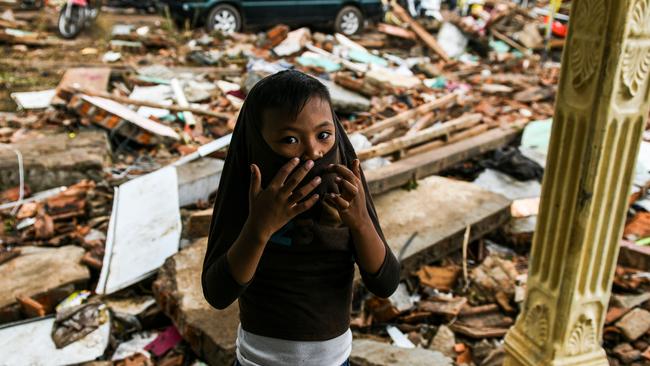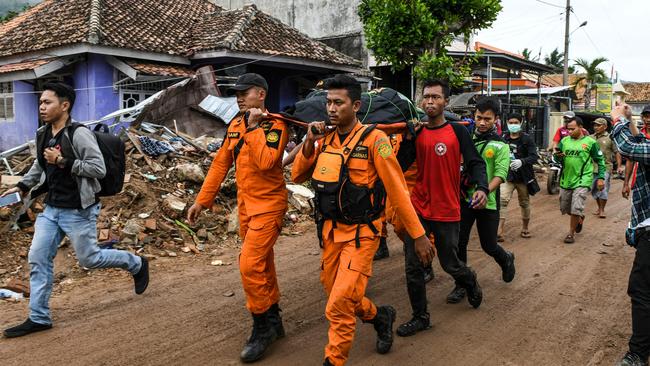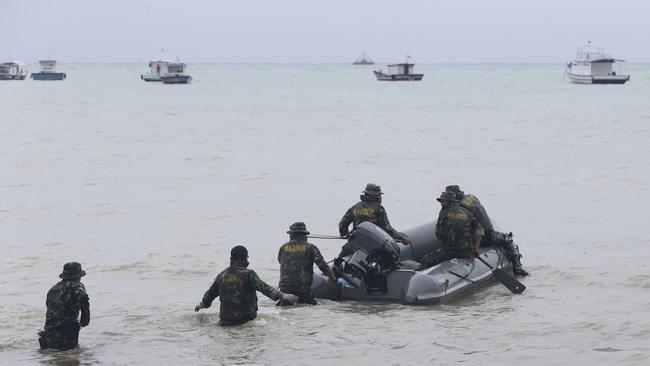Distant rumbles stoke fears of new tsunami
Thousands living around the Sunda Strait are on edge as rumbling continues from the volatile Mount Anak Krakatoa.

For the past four days, thousands living in coastal towns and villages around Indonesia’s Sunda Strait have been on the edge of panic as rumbling continues to be heard from the volatile Mount Anak Krakatoa, 40km offshore.
An underwater landslide from the south side of the island volcano, triggered by an eruption at 9.27pm on Saturday (1.27am Sunday AEDT), is responsible for a tsunami that claimed at least 429 lives, injured nearly 1500 and left 154 others missing.
With scientists warning a second eruption could trigger another tsunami, more than 16,000 people in western Java and southern Sumatra have sought refuge inland.
Tengku Umar, 54, said men in his village, Tancang, on the western coast of Java, dared to check on their houses only for a few hours every morning while the women and children were too afraid to come back at all.
“You can hear the volcano rumbling almost every minute. At night, we can see the top of the volcano glowing red.
“Until the volcano is back to normal, I don’t think we will go back to our houses,” Mr Umar told The Australian.

The island volcano, known as “Child of Krakatoa”, had shown increased activity, spewing ashes and glowing lava rock intermittently, since late September. But since Mount Anak Krakatoa is so far out at sea, authorities had believed the volcano posed no immediate threat and kept its alert status low.
Meanwhile, locals had become accustomed to the constant rumbling sounds and lava spills.
That all changed when the tsunami hit. Ever since, every activity from the volcano and changes of the sea are treated with suspicion.
Wahyudin, 43, was in his car with his teenage son when the tsunami struck, sending a towering wave of up to 3m high.
“I heard people crying for help. I thought there had been an accident. But suddenly I couldn’t control my car and we veered off the road. I looked out the window and saw water everywhere. Then the second wave hit and we were swept away for 200 metres,” he said.
Wahyudin and his son managed to climb out of the passenger’s window before the car went under. When the water receded, he instinctively headed off to a nearby hill.
Daylight revealed the extent of the devastation. In the village of Sambolo, where Wahyudin found himself stranded, cars, wooden beach huts and trees had been swept hundreds of metres.
It was the same story in all of the affected areas.
The Christmas holiday was somber with prayers for tsunami victims in the Indonesian region hit by waves that struck withoutwarning Saturday night. Markus Taekz said the Rahmat Pentecostal Church in the hard-hit area of Carita did not celebrate withjoyous music.
Instead, he said only about 100 people showed up for the Christmas Eve service, usually attended by double that number, becausemany people had left the area for the capital, Jakarta, or other areas away from the disaster zone. Noting the disaster thatkilled hundreds, he said, “Our celebration is full of grief.” Indonesia is mostly Muslim with Christians, Hindus and other religions as well. Church leaders called on Christians to pray for victimsof the tsunami.

At Villa Aviredita, in Cinangka village, half a dozen cars were piled up on top of each other while several others crashed into the bedrooms of the resort. Two tourists who were sitting in front of their rooms, were pinned by the swept cars and drowned by the incoming wave.
Octria Tommy Christika said he was hoping to spend the weekend with his wife and three friends at the Tanjung Lesung Beach Resort, the worst-affected area.
A concert by the rock group Seventeen was being held at one end of the resort and at the other two functions for state employees. Mr Christika said the concert had drowned out the sound of the eruption.
The first wave of the tsunami hit and knocked off electricity. “It was only then that we can hear the sound of people screaming and the sound of the second more powerful wave coming towards us,” he said.
The only survivor of the band, lead singer Riefian “Ifan” Fajarsyah, yesterday buried his wife, actress Dylan Sahara, in her home town of Ponorogo on the east side of Java island. Running for parliament at next year’s election, she died a day before her 26th birthday.
Fajarsyah’s three bandmates were also killed.
The spokesman for disaster agency BNPB, Sutopo Purwo Nugroho, admitted that so many were killed because Indonesia does not have an early warning system that could detect volcano-triggered tsunamis.
Desperately-needed aid flowed into the disaster zone, but humanitarian workers warned that clean water and medicine supplies were dwindling as thousands crammed makeshift evacuation centres.
With wires


